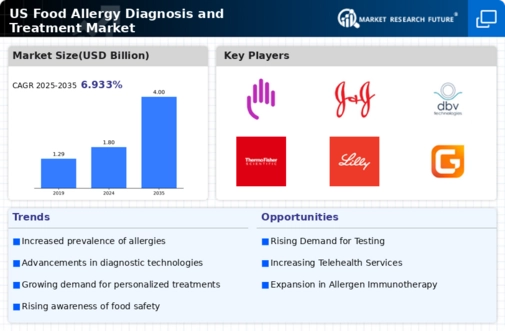The US Food Allergy Diagnosis and Treatment Market is a rapidly evolving sector marked by a growing prevalence of food allergies among all age groups. With increasing awareness and advancements in medical technologies, the competitive landscape is characterized by innovation in both diagnostic and therapeutic solutions. Companies within this market are focusing on enhancing patient outcomes through tailored approaches that range from lifestyle management to cutting-edge treatments. The dynamic interplay between established players and emerging start-ups is driving investments in research and development, with a keen emphasis on developing comprehensive methods for managing food allergies.
As the market continues to grow, strategic partnerships and collaborations are becoming increasingly common as companies aim to leverage collective expertise and resources. Stateside Foods has established itself as a noteworthy player in the US Food Allergy Diagnosis and Treatment Market, focusing on creating food products specifically tailored for individuals with food allergies. The company has maintained a strong market presence by prioritizing safety and allergen-free formulations, which resonate with consumers seeking safe dietary options. Stateside Foods has effectively utilized rigorous testing and quality control measures to enhance its reputation among healthcare providers and consumers alike.
Their commitment to education regarding food allergies and symptom management contributes to their competitive edge, enabling them to form long-lasting relationships with both customers and healthcare professionals. The brand's unique value proposition lies in its ability to offer delicious and safe food alternatives that not only meet dietary restrictions but also appeal to broader consumer preferences. Bristol Myers Squibb is a prominent entity in the US Food Allergy Diagnosis and Treatment Market, known for its development of innovative therapies and biopharmaceuticals that address food allergies.
The company boasts a robust portfolio that includes targeted treatments aimed at desensitization and improved patient management. Bristol Myers Squibb’s extensive research initiatives and collaborations with academic institutions have significantly advanced the understanding of food allergies, thereby fostering a pipeline of breakthrough products. Their strength lies not only in their comprehensive product offerings but also in their significant investments in mergers and acquisitions that expand their capabilities in allergy management.
The company's commitment to enhancing patient care through innovative solutions is evident in their proactive approach toward R&D, which strives to meet the growing demand for effective food allergy management in the U.S. market.























Leave a Comment